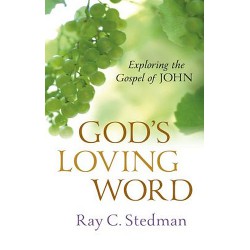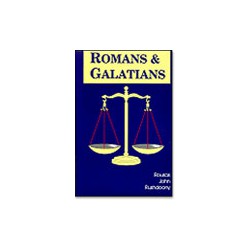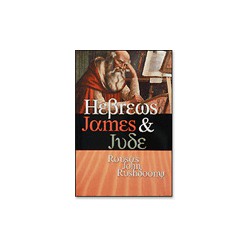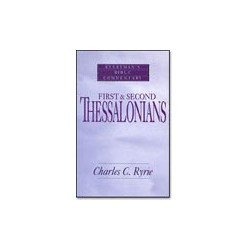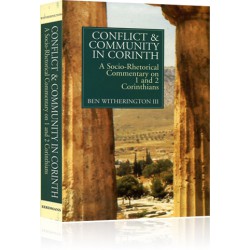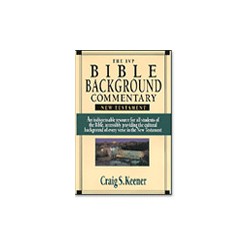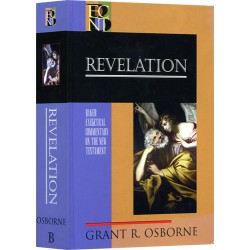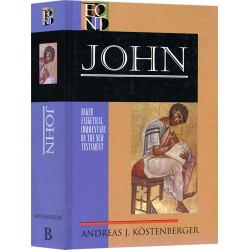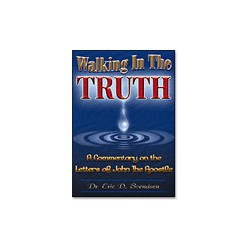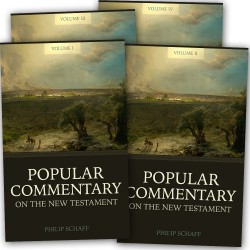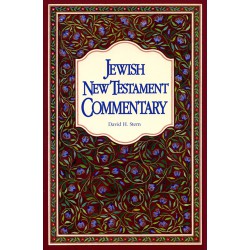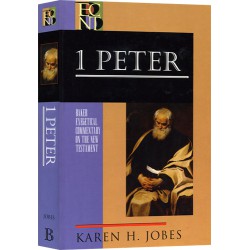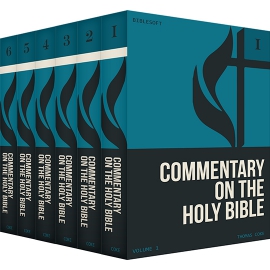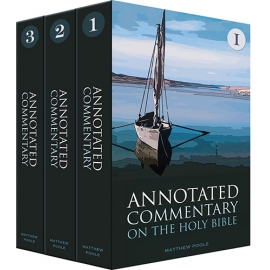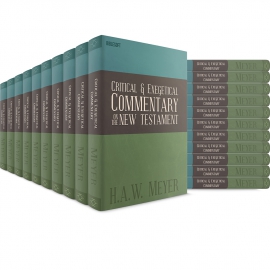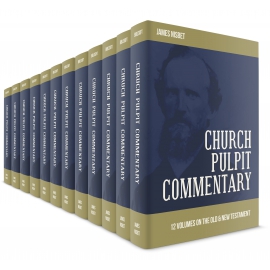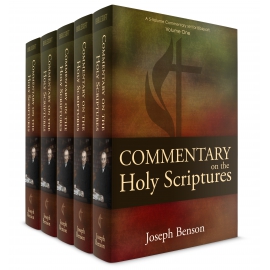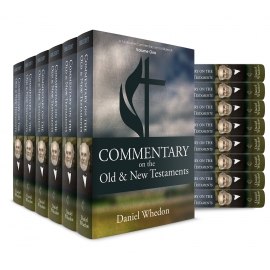No products
Product successfully added to your shopping cart
There are 0 items in your cart. There is 1 item in your cart.
 View larger
View larger
IVP New Testament Commentary Series (18 vol.)
Preachers, teachers, students and other individuals who want to dig deep into the heart of the New Testament will find an indispensable companion in the IVP New Testament Commentary Series.
BIBLESOFT DOES NOT SELL EBOOKS
Requires Program PCSB Version 5 or OneTouch (find out more)
- Write a review
Product Information
- 18-volume set covering 24 books* of the NT (over 5,200 pages)
- Verse-by-verse and phrase-by-phrase commentary with extensive date, authorship and exegetical issues covered
- Based on the New International Version of the Bible
- Modern scholarship from the best evangelical pastors, teachers and scholars
- Clear exposition of the text that pays attention to important issues of translation
- PC Study Bible feature allows this resource to be viewed in a commentary or book (table of contents) view
Designed for preachers, teachers and anyone desiring a deeper understanding of the New Testament
Based on the New International Version of the Bible, one of the most widely used modern translations, the IVP New Testament Commentary Series builds on the NIV 's reputation for clarity and accuracy. Individual commentators indicate clearly whenever they depart from the standard translation as required by their understanding of the original Greek text.
Each volume presents passage-by-passage commentary along with background information on authorship, setting, theme and various interpretive issues. A unique format allows the main commentary to focus on the vital message of the New Testament for today's church, while bottom-of-the-page notes include valuable scholarly information to support those who use the volumes as a resource for preaching or teaching preparation.
Seldom have such readable commentary and reliable research helps been available in the same volume! Preachers, teachers, students and other individuals who want to dig deep into the heart of the New Testament will find an indispensable companion in the IVP New Testament Commentary Series.
About the Titles
Click a title name below to read information about the book.
| Matthew By Craig S. Keener |
2 Corinthians By Linda L. Belleville |
1-2 Timothy & Titus By Philip H. Towner |
| Luke By Darrell L. Bock |
Galatians By G. Walter Hansen |
Hebrews By Ray C. Stedman |
| John By Rodney A. Whitacre |
Ephesians By Walter L. Liefeld |
James By George M. Stulac |
| Acts By William J. Larkin |
Philippians By Gordon D. Fee |
1 Peter By I. Howard Marshall |
| Romans By Grant R. Osborne |
Colossians & Philemon By Robert W. Wall |
1-3 John By Marianne Meye Thompson |
| 1 Corinthians By Alan F. Johnson |
1-2 Thessalonians By G. K. Beale |
Revelation By J. Ramsey Michaels |
 Matthew
Matthew
By Craig S. Keener
Matthew was the most popular Gospel in the early church, widely read for its clear emphasis on Jesus' teaching. Drawing on its use as a teaching or discipleship manual, Craig Keener expounds Matthew as a discipleship manual for believers today. In his skilled hands, this first-century text becomes as relevant and contemporary as information downloaded from the Internet, while it challenges us with its divine perspective on how life ought to be lived.
In this clear, incisive commentary, readers will find an introduction with background material concerning authorship, date and purpose, as well as a summary of important theological themes. A passage-by-passage exposition follows that focuses on understanding what significance the Gospel of Matthew had for its original readers in order to see its relevance for the church today.
 Luke
Luke
By Darrell L. Bock
In Luke's vivid narrative, Jesus comes into Galilee proclaiming "good news to the poor . . . freedom for the prisoners and recovery of sight for the blind." More than any other Gospel, the Gospel of Luke shows Jesus' great concern for the downtrodden, the oppressed and the marginalized--including women and children and even those outside the house of Israel.
Darrell Bock's IVP New Testament Commentary shows why Luke's Gospel is "tailor-made" for the world we live in--a world often divided along ethnic, religious, economic and political lines. After all, the Jesus portrayed by Luke is a source of unity for his disciples and for believers from every walk of life. Tax collectors, Roman soldiers, prostitutes, city officials, religious leaders, widows and fishermen were among the diverse group brought together in the early Christian church. "The Gospel is universal in its perspective and cosmic in its scope," Bock writes. "As we look at our modern multicultural world, . . . certainly there is relevance in a Gospel that highlights how men and women of different ethnic origins can be transformed into a unified community."
Along with a passage-by-passage exposition of Luke, Bock offers background information on date, destination, purpose, form and theological themes in the text. His dual focus on understanding what Luke wanted to communicate to his original readers and on discovering how that message is relevant for today's readers will make this commentary an excellent resource for all who study, preach or teach the Scriptures.
 John
John
By Rodney A. Whitacre
The Gospel of John declares its purpose clearly--"these are written that you may believe that Jesus is the Christ, the Son of God, and that by believing you may have life in his name." Thus it fulfills a dual function, encouraging believers and providing them with evidences for proclaiming that Jesus is God's Messiah, the divine, incarnate Son of God.
Christians today, as in the first century, can draw strength and courage from John's telling of the story of Jesus, a telling that consistently reflects not only the words and deeds of Jesus but their inner significance. We are called to worship as we find the Father, Son and Spirit revealed in the Gospel. And as in Jesus we discover God's light, life and love, we learn to respond in faith, humility and obedience.
In this engaging, pastorally-oriented commentary, readers will find an introduction with background material concerning authorship, date and purpose, as well as a summary of important theological themes. A passage-by-passage exposition follows that focuses on understanding what John had to say to his original readers in order to see its relevance for the church today.
Students, pastors, Bible teachers and everyone who wants to understand the message of John for the church will benefit from this excellent resource.
 Acts
Acts
By William J. Larkin
If ever there was a hostile environment for the gospel, it was the strife-torn, ethnically diverse backwater of the Roman Empire known as Palestine following the ascension of Jesus. But the gospel thrived--beginning from Jerusalem and spreading throughout Judea, Samaria and the rest of the known world.
In Acts, the sequel to his Gospel, Luke tells how the Holy Spirit transformed a ragtag band of believers into a unified, world-engaging church. And as William Larkin explores this narrative of the early church, he offers inspiration and insight for readers who wonder how the gospel may be advanced in the increasingly divided and skeptical culture of the late twentieth century.
In this clear, incisive commentary, readers will find an introduction with background material concerning authorship, date and purpose, as well as a summary of important theological themes. A passage-by-passage exposition follows that focuses on understanding what significance Acts had for its original readers in order to see its relevance for the church today. Students, pastors, Bible teachers and everyone who wants to understand the message of Matthew for the church will benefit from this excellent resource.
 Romans
Romans
By Grant R. Osborne
Few individual books of the Bible have changed the course of church history the way Paul's letter to the Romans has.
Whether one thinks of Augustine's conversion in the fourth century, Luther's recovery of justification by faith in the sixteenth or Barth's challenge to recover theological exegesis of the Bible in the twentieth, Romans has been the catalyst to personal spiritual renewal and the recapturing of gospel basics.
Paul, in seeking to bring unity and understanding between Jews and Gentiles in Rome, sets forth in Romans his most profound explication of his gospel and its meaning for the church. The letter's relevance is as great today as it was in the first century.
In Grant R. Osborne's careful study of Romans, readers will find an introduction that sets the letter in context and surveys its general content, highlighting issues surrounding its authorship, date, occasion and purpose. Passage-by-passage commentary follows that explains what the letter means to us today as well as what it meant for its original hearers.
Students, pastors, Bible teachers and everyone who wants to understand Paul's message for the church will benefit from this excellent resource.
 1 Corinthians
1 Corinthians
By Alan F. Johnson
Upwardly mobile Christians facing radically diverse ethnic, religious, economic and social conditions. The church divided over issues of leadership and authority, sexual morality, gender and worship, marriage and divorce. Sound familiar?
First-century Corinth and its challenges were not so different from our own. Yet in the midst of this detailed, practical letter to a church in crisis is found one of the greatest paeans to love ever written. And, of course, love is just what is needed to address complex human issues--whether in the first century or the twenty-first.
Alan F. Johnson's deft analysis of 1 Corinthians features an introduction that explores the social, cultural and historical background of the city and its people. Rounding out the introduction, Johnson discusses the letter's occasion and date, authorship and purpose, and major theologicall themes. His passage-by-passage commentary follows, seeking to explain what the letter of 1 Corinthians means for the church today as well as what it meant for its original hearers.
Students, pastors, Bible teachers and everyone who wants to understand Paul's message for the church will benefit from this excellent resource.
 2 Corinthians
2 Corinthians
By Linda L. Belleville
Church conflict is never pleasant--whether the issue is theological or practical, whether it is over the character of the gospel or over how to spend church funds. Though few church squabbles today come close to matching the intensity and seriousness of what Paul faced in the commercial and hedonistic hotbed of Corinth, his strategies and pastoral wisdom in confronting the problems there can still serve as a helpful model for us in responding to a culture marked by individualism and materialism.
In this careful study of 2 Corinthians, readers will find an introduction that discusses the letter's occasion and purpose, authorship, and other background information, as well as its important theological themes. Passage-by-passage commentary follows that seeks to explain what the letter means for us today as well as what it meant for its original hearers. Students, pastors, Bible teachers and everyone who wants to understand Paul's message for the church will benefit from this excellent resource.
 Galatians
Galatians
By G. Walter Hansen
"Wherever ethnic rivalries are destroying societies, the book of Galatians calls Christians to express the truth of the gospel in communities where there are no ethnic or social or gender divisions." With this strong admonition, Walter Hansen introduces his IVP New Testament Commentary on Galatians.
Unlike many other commentaries, Hansen's volume highlights not only the individual dimensions of justification by faith but also its social implications. But like all the volumes in The IVP New Testament Commentary Series , it seeks to explicate the Scriptures with historical accuracy and textual faithfulness, providing helpful explanatory notes and a passage-by-passage commentary in a user-friendly format.
But Hansen strives to do even more. With a pastor's conviction and concern, he aims to move from the text itself to its contemporary relevance and application. His bold, careful interpretation challenges students and teachers of this important Pauline letter to move beyond merely the question "How can I, a sinner, be right before a just and holy God?" and to find in Galatians a healing word addressed to the ongoing tensions of race, class and gender--a word worked out in the life of the whole church.
"If a church does not defend in practice the equality and unity of all in Christ," writes Hansen, "it implicitly communicates that justification is not by faith but by race, social status or some other standard. Faith must not be defined in individualistic terms; faith as Paul defines it . . . is 'faith working through love.'"
 Ephesians
Ephesians
By Walter L. Liefeld
"More than any other book of the Bible, Ephesians displays the great purpose and plan of God for the church," Walter Liefeld writes. "It provides a perspective that is unique: God's--and the believer's--view from the 'heavenly realms.'"
For those who long to delve into the mind and purposes of God, few books are more helpful than Paul's letter to the Ephesians. Here the apostle paints in broad strokes the great plan of God for his church, centered on its head, Jesus Christ, and living out its calling in praise of God's glory. Beginning with doxology, Paul calls on the church to support its words of praise with deeds to match. Christians today will find here inspiration and insight that will confirm their allegiances and shape their lives.
Written with warm pastoral insight, this commentary supplies readers with a helpful introduction, covering authorship, date, background material and a summary of theological themes. A passage-by-passage exposition follows that focuses on understanding what Paul had to say to his original readers in order to see its relevance for the church today.
 Philippians
Philippians
By Gordon D. Fee
Nothing cripples a church's effectiveness like internal strife. In Philippi, Paul addressed a congregation whose private struggles were compounded by opposition and suffering from without. Paul's strategy was to write them a letter of friendship and moral exhortation, reminding them of their "partnership in the gospel," their mutual suffering for the cause of Christ, and their need to "stand firm in one spirit." His approach and counsel can serve us well today.
In this warm, well-written study of Philippians, readers will find an introduction that discusses the letter's occasion and purpose, authorship, and other background information, as well as its important theological themes. Passage-by-passage commentary follows that seeks to explain what the letter means to us today as well as what it meant for its original hearers.
 Colossians & Philemon
Colossians & Philemon
By Robert W. Wall
To the Colossians, preoccupied with legal codes and intellectual disputes, Paul wrote a letter stressing not only the centrality of Christ but also the need for Christians to live out their faith in genuine community. Paul's antidote to a privatized and intellectualized faith will provide relief to many Christians today.
To Philemon, a powerful church leader, Paul wrote a strong personal letter asking him to embark on a new relationship with his slave Onesimus. Drawing on insights from Scott Bartchy, Robert Wall argues that the issue had more to do with power relationships than with slavery. As a model for conflict resolution and mutual relations within the Christian community Paul's letter has much to offer the church today.
In this careful study of Colossians and Philemon, readers will find introductions that discuss the letter's occasion and purpose, authorship, and other background information, as well as important theological themes. Passage-by-passage commentaries follow that seek to explain what each letter means for us today as well as what it meant for its original hearers.
 1-2 Thessalonians
1-2 Thessalonians
By G. K. Beale
Fascination with the end times is not just a recent phenomenon.
The young church at Thessalonica, having taken root during Paul's brief stay there, pondered when the end might come as well. Paul, in order to instruct them more fully, wrote them two letters, which taken together expound the "already-and-not-yet" character of his views of the end times. His instruction and counsel can serve us well today.
In this careful study of 1-2 Thessalonians, G. K. Beale offers an introduction that sets the letters in context and surveys their general content, highlighting issues surrounding their occasion and purpose. His passage-by-passage commentary seeks to explain what these letters mean to us today as well as what they meant for their original hearers.
 1-2 Timothy & Titus
1-2 Timothy & Titus
By Philip H. Towner
Questions about the nature of Christian leadership and authority, attitudes toward wealth and materialism, proper responses to cults, the role of women in the church, and even the validity of the institution of marriage are not new. Paul addressed these issues in personal letters to Timothy and Titus as leaders of first-century congregations in Ephesus and Crete. What he had to say to them is as relevant to us as today's newspaper headlines.
In this clear, pastorally oriented commentary, readers will find helpful background material on authorship, date and purpose, as well as an overview of theological themes in the Pastoral Epistles. The introductory material is followed by passage-by-passage explanation of the meaning these letters had for their first-century hearers in order to pave the way for understanding their significance for readers today.
 Hebrews
Hebrews
By Ray C. Stedman
For people beginning to doubt the uniqueness and supremacy of Christ, the author of the book of Hebrews provided one of the longest, most profound arguments in the New Testament. Christians today will find their understanding stretched and their loyalty confirmed by this rich presentation of our great High Priest, the Son of God, whose sacrifice of himself took away our sins and gave us continual access to God.
Written in a fresh, succinct style, this commentary from a leading evangelical pastor supplies helpful background information that paves the way for our seeing what the text means for us today as well as what it meant for its original hearers.
 James
James
By George M. Stulac
What is the proper relationship between faith and deeds? How do Christians mature in the faith? What hope can we offer to those who face trials of various sorts? How do we learn to control our tongues and not get bogged down with riches?
The apostle James faced these questions in profound ways and offered sound pastoral advice to his readers, scattered by persecution. His word to them can become a vital word to us if we are prepared to listen.
In this keen, pastorally oriented commentary, readers will find helpful background marterial concerning authorship, date and purpose, as well as helpful, passage-by-passage commentary. The exposition focuses on understanding what James had to say to his original readers in order to see its relevance for the church today.
 1 Peter
1 Peter
By I. Howard Marshall
As a young church in a hostile environment, Peter's first readers found in his letter encouragement, not just for facing suffering, but for living responsibly in the world as faithful disciples of Jesus Christ. Christians today will also find in Peter's letter a wealth of practical counsel on how to conduct themselves in family and social life, as well as in relation to a society that makes it tough to follow Jesus Christ.
In this invigorating volume from one of today's leading evangelical scholars, readers will find an introduction that discusses the letter's form, authorship, destination and primary theological themes, followed by a passage-by-passage commentary that always seeks to answer the question of what the text means for us today as well as what it meant for its original hearers.
 1-3 John
1-3 John
By Marianne Meye Thompson
When to fight and when to compromise are not always easy choices to make. Stubbornly defending the truth can easily end up in arrogance that discredits the gospel, while too readily seeking middle ground can leave truth by the wayside.
Torn by conflict and marred by schism, the congregation to whom John addressed his letters stood in need of his strong exhortations to love and unity within the bounds of truth. God's Word to them is well suited to the church today, confronted by controversies within and without that challenge its ability and will to stand for the truth in a pluralistic society.
In this careful study of John's letters, readers will find an introduction that discusses the letters' occasion and purpose, authorship and date, order and theological themes. A passage-by-passage commentary follows that seeks to explain what each letter means for us today as well as what it meant for its original hearers.
 Revelation
Revelation
By J. Ramsey Michaels
Interpretations of the book of Revelation are numerous and varied. The preterist view focuses on first-century social analysis of John's environment. The church-historical view sees the Revelation as a prophetic survey of the history of the church. The futurist view sees the book as a precise prediction of unfolding events in the yet-to-come end of the world.
The trouble with all three, argues J. Ramsey Michaels, is that they make the Revelation of John irrelevant to Christians throughout much of history. Failing to take seriously what John saw, such interpreters do not comprehend the value of the Revelation to Christians in any age. Michaels strives to recapture the Revelation as a prophetic letter of testimony, a testimony as relevant to today's church as it was to John's in facing evil and looking forward to the victory of the Lamb.
Product Details



